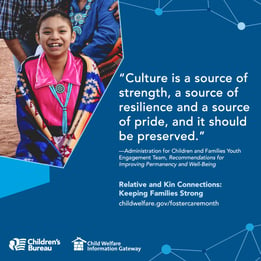Celebrating National Foster Care Month and Mental Health Awareness Month
Raising a family is no small feat, and even parents who love their children can find themselves in a position where they cannot adequately care for them. Through services like Foster Care and other community support programs, we can work on healing and prevention.
We believe everyone deserves to live a fulfilling and healthy life, regardless of their circumstances and diagnoses. Resource families, aka foster parents, can support foster youth’s mental health by being the safe place they call home. Care and support are not just limited to the home. Communities and biological families of foster children also play a huge role during their time in foster care.
May is National Foster Care Month and Mental Health Month, two topics Victor is particularly passionate about. We’ve been working to help others soar with mental and behavioral health and family services for over 65 years.
Each year, the Children’s Bureau decides a theme for Foster Care Month to highlight an aspect of the program. This year’s theme is "Relative and Kin Connections: Keeping Families Strong.” We understand that from a larger societal view, foster care can look like an institution that separates families in a disruptive manner, but we’d like to offer a more accurate view. This year’s theme helps us do that while also talking about the mental health of children and teens in foster care.
Keeping Families Strong
The theme “Relative and Kin Connections: Keeping Families Strong” speaks to the desire for reunification and keeping families healthy and whole whenever possible. Creating strong communities and networks helps prevent child abuse, including neglect, which is the most common form. Although we believe that resource parents who aren’t biologically related to their foster children can offer amazing love and support, we want to point out the out specific benefits of kinship care. Keeping children in familiar and culturally relatable environments promotes resiliency and better mental health
The specific community of ‘kin connections’ refers to the goal of keeping children in foster care within their biological family. Prioritizing keeping children within their families also means we need to support those families. This looks like providing culturally aware support and helping the families get trained and ready to serve in a foster role.
The official statement for this year’s theme, written by the Associate Commissioner of the Children’s Bureau goes into more detail.
National Foster Care Month 2022 Children’s Bureau Message
Written by Aysha E. Schomburg, Associate Commissioner of the Children’s Bureau
Every child deserves to keep the meaningful connections they have with their relatives. This National Foster Care Month, the Children's Bureau is focusing on these connections and the important role kinship care has in the foster care system. Our theme this year, "Relative and Kin Connections: Keeping Families Strong," speaks to the positive impact relative and fictive kin have during the journey to permanency. Families are more than experts on their own lives, they are a source of stability and comfort. However, when a child cannot safely stay with their parents, kinship care must be the first path we take.
As foster care is a support to families, children should stay with family when possible. In many cultures, the "village" approach has been a longstanding value, and extended family is important to the development of children who feel surrounded by love and the continuation of cultural traditions. Whether formally through child welfare or informally through family arrangements, kinship care maintains bonds and reduces trauma. These bonds help children and youth develop their identity, live within their cultural roots, and foster a sense of belonging—all things that are essential to their well-being. …
Read the rest of the message CLICK HERE
You can see statistical evidence of the impacts of kinship care in the following points provided by the Children’s Bureau. They provide updated figures every year for the most accurate information possible. You can learn more by following the links in each point.
Foster Care Key Facts and Statistics
- There are over 407,000 children and youth in foster care, and 34 percent were placed with relatives or kin.
- The term kin encompasses both relatives (those related by blood or marriage) and fictive kin (those who are unrelated but have such a close emotional relationship that they are considered like family to children and youth).
- When children cannot remain safely in their home, placement with relatives and kin —both formally through the child welfare system and informally through family arrangements—can increase stability, reduce trauma, and help children maintain a sense of family, belonging, and identity.
- Investing in culturally appropriate services and supports for relative and kin caregivers may help reinforce a child’s cultural identity and traditions.
- The inclusion of kin and extended family members in case planning expands placement and permanency options for children and youth when in-home care is not feasible.
- Millions of children and youth live with relatives outside of the formal child welfare system. Kinship navigator programs can provide critical supports for relative caregivers, including connections to resources and benefits, financial and legal assistance, peer supports, and more.
- Relational permanency is fundamental to the well-being of children and youth. Maintaining relationships with relatives and kin can help provide a sense of belonging for young people in care.
- Exploring relational permanency can lead to legal permanence. Of all children and youth waiting for adoption, 25 percent were placed with relatives. Of those aged 14 and above, 14 percent were placed with relatives.
- Providing equitable services and supports to grandfamilies can positively impact placement stability and permanency outcomes for children and families. Grandparent caregivers are more likely to be older than age 55 (62 percent), less likely to be married (44 percent), and grandparent caregivers outside of the child welfare system are less likely than foster parents to have health insurance (28 percent) (Children Living Apart from Their Parents: Highlights from the National Survey of Children in Nonparental Care).
Mental Health Benefits of Placements with Relatives and Kin
 Foster youth are more likely to face mental health issues than their non-foster care counterparts. The most common issues are related to trust, attachment, and anxiety. Placing a child or teen in foster care with their biological family, when it’s appropriate, helps in preventing some sources of common mental health issues.
Foster youth are more likely to face mental health issues than their non-foster care counterparts. The most common issues are related to trust, attachment, and anxiety. Placing a child or teen in foster care with their biological family, when it’s appropriate, helps in preventing some sources of common mental health issues.
One of the difficult experiences for foster youth is moving between different homes and schools. Consistent relationships and the feeling of being safe and known are crucial to childhood development and healthy self-esteem in teenagers. By supporting extended family with resources, we can place children in homes and keep them in communities where they are known.
The feeling of belonging is so important to children and teens, and we want to help them feel that as often as we can. Furthermore, having consistent relationships enables caretakers to know and become aware of any challenges a child in foster care has. Parent’s and supportive adults can be there to help them work through issues and engage in preventing behavioral and mental health issues simply by knowing them over a span of time.
By staying within the family, a foster child maintains relationship with people who know them and remain in a setting that is culturally familiar. This also allows them to feel loved by their family, even when separated from their parents. It can help prevent or lessen thoughts of “Do my parents not love me anymore?”
We are thankful for the family members who step up to foster their family when they are called upon. We are equally thankful for those who take up the call regardless of biological family ties.
Being a foster parent is never without its challenges, but it’s one of the most rewarding things you can choose to do with your life. All the evidence points to the fact that a safe home with a stable guardian improves the lives of teens and youth in foster care. If you have any questions about becoming a foster parent, we would love the opportunity to speak with you further.
For more information about our programs and how we can help, visit our website or contact us today.

